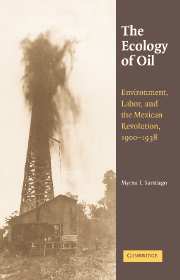Book contents
- Frontmatter
- Dedication
- Contents
- List of Maps, Figures, Tables, and Appendices
- Acknowledgments
- Introduction
- PART ONE THE HUASTECA BEFORE OIL
- PART TWO THE ECOLOGY OF OIL
- 2 Controlling the Tropical Forest: The Shift in Land Tenure Patterns
- 3 The Anatomy of Progress: Changing Land Use Patterns
- 4 “Masters of Men, Masters of Nature”: Social Change in the Huasteca
- PART THREE CHALLENGING THE ECOLOGY OF OIL
- Conclusion
- Epilogue
- Appendices
- A Note on the Sources
- Archives Consulted
- Selected Bibliography
- Index
4 - “Masters of Men, Masters of Nature”: Social Change in the Huasteca
from PART TWO - THE ECOLOGY OF OIL
Published online by Cambridge University Press: 05 March 2015
- Frontmatter
- Dedication
- Contents
- List of Maps, Figures, Tables, and Appendices
- Acknowledgments
- Introduction
- PART ONE THE HUASTECA BEFORE OIL
- PART TWO THE ECOLOGY OF OIL
- 2 Controlling the Tropical Forest: The Shift in Land Tenure Patterns
- 3 The Anatomy of Progress: Changing Land Use Patterns
- 4 “Masters of Men, Masters of Nature”: Social Change in the Huasteca
- PART THREE CHALLENGING THE ECOLOGY OF OIL
- Conclusion
- Epilogue
- Appendices
- A Note on the Sources
- Archives Consulted
- Selected Bibliography
- Index
Summary
The foreigner, having increased the worker's wage so that better living became a possibility, went on to teach him how, and surrounded his attempts with kindly thought and guidance. There is not another field of labour in the world the lowly have had the considerate and intelligent treatment as is given in Mexico to this great helpless labouring class by the English and Americans. Schools for their children, hospitals for their sick, baths, recreation centers for their entertainment, sanitary homes for their families; water and gardens furnished.
Caspar Whitney, 1916All petroleum companies in Mexico have been a blessing to the communities in which they have operated.
Edward L. Doheny, 1922The oil tycoons could not change the landscape alone. They needed numerous men working for them to do so. Yet one of the problems that had bedeviled the Huasteca elite for a half-century was precisely the low population density and, therefore, the lack of labor available for modernization. The oilmen had to solve that conundrum. To exploit oil they needed not only to change land tenure patterns and uses, but also to find men to do the physical work. They needed, in other words, to change the social composition of the Huasteca. As they did so, the oilmen also introduced new social relations to the area: early twentieth-century capitalist industrial relations, with the added peculiarities of English and American racism. The hierarchies implied therein, moreover, encompassed the environmental realm. Even though bosses and workers changed the landscape together, their experience of and in the neotropics differed substantially depending on their position in the occupational ladder. That is, class and color deeply influenced the relationship between men and nature in the production process. The ecology of oil thus entailed changes in the social composition and structure of the Huasteca.
The Recruitment of the Labor Force
The tycoons had to confront the reality that the object of their desire was buried in what they considered inaccessible areas with no workers. To extract the oil, the companies had to import labor. Migration, then, became essential to the enterprise. Both English and American companies followed a pattern of multinational labor recruitment typical of other foreign-owned industrial enterprises in Mexico: supervisory positions were reserved for men from abroad, whereas the menial labor was procured locally.
- Type
- Chapter
- Information
- The Ecology of OilEnvironment, Labor, and the Mexican Revolution, 1900–1938, pp. 148 - 202Publisher: Cambridge University PressPrint publication year: 2006



